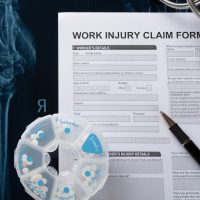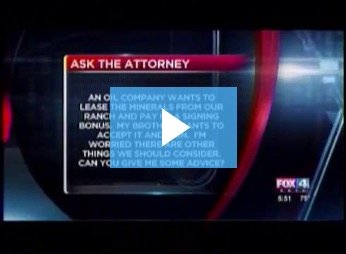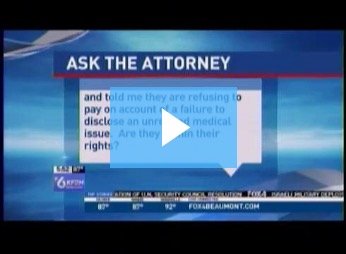Workers’ Compensation vs. Personal Injury Claims in Texas

If you’ve been hurt on the job in Texas, you may assume that workers’ compensation is your only avenue for financial recovery. While that’s sometimes the case, it’s not the whole story. You may have the right to benefits instead of or sometimes in addition to a workers’ compensation claim if you are injured while in the course and scope of your usual employment. This is true, regardless of whether your worksite is in a refinery, hospital, manufacturing plant, retailer, restaurant, logging woods, ship, or on the road, driving for your employer.
At Gilbert Adams Law Offices, we help injured workers across Southeast Texas and statewide understand their legal rights and fight for the full compensation they deserve. Here’s what you should know about the differences between workers’ compensation and personal injury claims—and when a personal injury lawsuit may be necessary or available to you after a workplace injury to recover compensation for your loss. For more information or dedicated assistance after a workplace accident in Beaumont and beyond, contact Gilbert Adamas Law Offices for a personalized review with an experienced and successful Texas workplace accident lawyer.
Workers’ Compensation: Limited But Inadequate and Incomplete Benefits
Workers’ compensation is a state-regulated insurance program that provides benefits to employees who suffer work-related injuries or illnesses. The key advantage of this type of administrative process is that you don’t have to prove anyone was at fault in order to recover benefits. It’s “no-fault.” If you’re hurt on the job or suffer a work-related accident or illness, you’re generally entitled to inflexible medical treatment, partial wage replacement (temporary income benefits), and sometimes impairment benefits.
This type of workers’ compensation has major limitations. Although your medical expenses are covered, you have a limited ability to choose your doctor or treatment plan. Lost wages are paid at only a fraction) of your regular pay and capped on top of that., More often than not, workers’ comp does not provide any compensation for reduced or loss of earning capacity, pain and suffering, and other types of damages attributed to even more important things in life. In short, workers’ compensation helps cover basic expenses after a work injury—but it does not make you whole.
When Can You File a Personal Injury Claim After a Workplace Accident?
Unlike workers’ compensation, most personal injury claims allow you to recover full compensation sometimes referenced as common law damages with equitable provisions existing for centuries, including:
- Medical expenses (past and future)
- Full lost wages and loss of earning capacity
- Physical Impairment
- Physical Pain and suffering
- Mental grief and anguish
- Physical Disfigurement
- Spousal damages
- Punitive damages in cases of gross negligence
But with personal injury, the burden is a little high to prove someone else was negligent or some product was defective legally causing your injuries. That might sound difficult—but in many industrial, oilfield, and construction accidents, third-party negligence claims have made a big difference in the lives of many workers hurt on the job, as well as their families.
Common Situations Where Personal Injury Claims Are Available in Work Accidents
Texas law provides several scenarios where injured workers may have the right to file a personal injury claim:
1. Negligent Third Parties
If your injury was caused by someone other than or in addition to your employer, you may be able to sue that party. Examples include:
- A subcontractor’s employee drops equipment on you at a construction site
- A defective machine or tool causes a serious injury
- You get injured in a vehicle crash caused by a negligent driver while you are on the clock
2. Non-Subscriber Employers
Unlike most states, Texas does not require your employer to purchase private employers to carry workers’ compensation insurance. If your employer is a non-subscriber, you are required to bring suit against them to recover for your injuries. There are time limitations and perhaps other important restrictions to these types of claims that can depend on the specific circumstances.
These cases are common in construction, oilfields, industrial work and other workplaces or worksites where employers have elected to opt out of the workers’ compensation system often referenced as a “non-subscriber” case.
3. Gross Negligence and Intentional Acts
Where your employer is a nonsubscriber, exemplary damages may be recoverable. However, except for wrongful death cases, current Texas law does not allow for recovery for gross negligence cases against your employer who was an approved workers’ compensation subscriber on the date of your injuries.
Workplace Accidents in High-Risk Industries in Texas
At Gilbert Adams Law Offices, we represent workers injured in some of Texas’ most dangerous industries, including:
- Oil and gas: Explosions, equipment malfunctions, and unsafe drilling practices
- Construction: Falls, crane accidents, electrocutions, and trench collapses
- Industrial plants: Chemical burns, toxic exposure, machinery injuries
- Logging Woods: unsafe equipment, lack of guards and unsafe drivers
These environments sometimes often involve multiple contractors, owners, operators and other worksites increasing the chance that a third party shares in the responsibility for the accident—opening the door to a potential recovery that is not available in a workers comp claim.
Talk to a Beaumont Personal Injury Lawyer Who Understands Workplace Injuries
If you’ve been seriously hurt on the job, don’t assume that workers’ compensation is your only option. You may be leaving significant money on the table. At Gilbert Adams Law Offices, we can help you determine whether a personal injury lawsuit is possible in your case—and pursue every available avenue to maximize your recovery.
We’re based in Beaumont and proudly serve injured workers throughout Southeast Texas and across the state. Contact us today for a free consultation.










